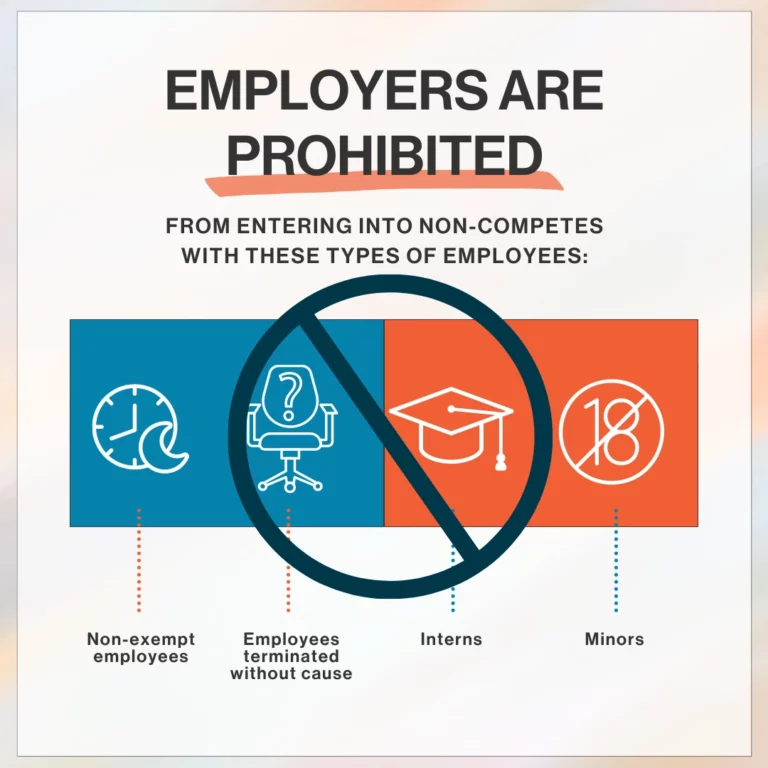Non-compete agreements, also known as restrictive covenant agreements, are contracts that protect companies from losing valuable employees to competitors and from confidential information ending up in the wrong hands. In August 2018, Massachusetts governor Charlie Baker signed into law the Massachusetts Noncompetition Agreement Act, which regulates non-compete clauses by limiting their enforceability and codifying express requirements they must meet (New Massachusetts Law Limits Non-Competes). The law went into effect October 1.
In an effort to protect employees, the new law generally bans employment-related non-compete agreements unless they meet certain requirements. (Non-disclosure and non-solicitation agreements are not impacted by this new legislation.) Let’s take a look at what this new law means for employers.
Non-compete agreements are contracts that protect companies from losing valuable employees to competitors and from confidential information ending up in the wrong hands. Click To TweetNon-Compete Agreement Requirements
The 2018 legislation outlines includes the following:
1. Under the law, employers are prohibited from entering into post-termination non-compete agreements with the following types of employees:
- Non-exempt employees
- Employees terminated without cause (including as a result of a layoff)
- Interns
- Minors

2. For all other employees, the scope of any non-compete agreement is limited as follows:
- Non-competes are limited to a term of one year (except in the event of an employee breach of fiduciary duty to the company or theft of company property), and employers must compensate employees during this period of non-competition.
- The geographic scope of a non-competition agreement must be “reasonable” in geographic reach in relation to the interests protected.
- A geographic reach limited to only the geographic areas in which the employee, during any time within the last two years of employment, provided services or had a material presence or influence is presumed to be reasonable.
- The agreement must be reasonable with respect to the types of activities that are prohibited under the agreement.
- A restriction on activities that protects a legitimate business interest and is limited to only the specific types of services provided by the employee at any time during the last two years of employment is presumed to be reasonable.
3. The law imposes the following notice requirements upon employers:
- New employees must receive notice that a non-compete agreement will be required as a condition of their job offer either before the job offer is communicated, or 10 days prior to their first day of work, whichever is earlier.
- Existing employees subject to a new non-compete agreement must have at least 10 days to review the agreement.
How To Think Strategically About Non-Compete Agreements
Do you really need to enforce the non-competition portion, or is it sufficient to say “We don’t want you to solicit our clients?”
Invoking the non-compete clause will likely be costly to your organization as companies need to provide “consideration” for signing the agreement. The “garden leave” provision requires employers to pay the employee at least 50% of the employee’s annual base salary at the highest level during the past two years for the restricted period or “other mutually agreed upon consideration”. Leadership and management ought to consider utilizing non-solicitation or non-disclosure agreements instead of non-competes to protect business information and relationships.
Determine which employees really need a non-compete. There are two groups to consider here:
- Employees who absolutely should sign a non-compete include senior level executives and key employees whose employment with a competitor would cause serious harm to your organization.
- Other employees who have access to company lists or information may not need a non-compete.
Review your current non-compete agreements.
All Massachusetts employers who use non-compete agreements should review their existing documents to ensure they comply with the new law. It is a best practice to include information on non-compete agreements in your employee handbook.
Beware of inside sales positions.
Non-compete agreements are often used in sales environments. Outside sales positions are typically exempt positions and fair game for non-competition agreements if they meet all of the other requirements of the new law; however, inside sales positions may be a concern. Many companies improperly classify their inside sales employees as exempt. The FLSA clearly defines inside sales positions as ineligible for exemption from overtime. Therefore, under this new law, inside sales positions should not be required to sign non-compete agreements. Perhaps this group of employees would be better served with non-solicitation and/or non-disclosure agreements instead.
Are you correctly classifying your employees?
Get the details on the Fair Labor Standards Act (FLSA) and make sure you’re not at risk.
Do you have questions about non-compete agreements in Massachusetts or New England?
If all this talk about non-compete clauses is causing you stress, talk to us. At Genesis, we’re in the business of helping small to midsize companies handle their HR, benefits, and payroll needs—and providing guidance on issues like non-compete agreements. To find out how we can help your organization tackle your HR headaches, get in touch. You’ll be glad you did!





